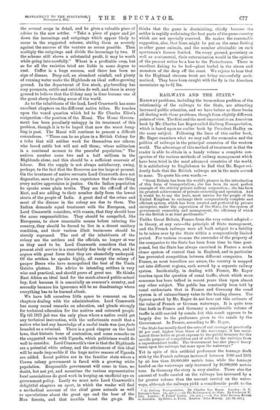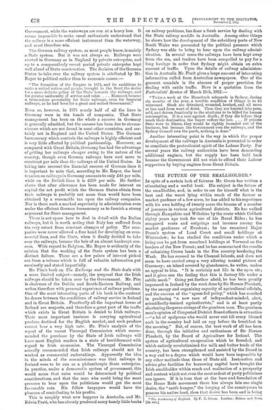RAILWAYS AND THE STATE.* RAILWAY problems, including the tremendous problem
of the relationship of the railways to the State, are attracting
increased public attention, and we have before us three books all dealing with these problems, though from slightly different points of view. The first and the most important is an American book by Mr. Charles Lee Raper called Railway Transportation, which is based upon an earlier book by President Hadley on the same subject. Following the lines of this earlier book, Mr. Raper examines what we may call the economics and the politics of railways in the principal countries of the western world. The advantage of this method of treatment is that the reader is able to obtain in a bandy volume a complete con- spectus of the various methods of railway management which have been tried in the most advanced countries of the world. It is satisfactory to Englishmen to find that Mr. Raper evi- dently feels that the British railways are in the main second to none. To quote his own words :—
" Great Britain has been the world's pioneer in the introduction of this form of transportation; she has been its most perfect example of the strictly private railway corporation ; she has been its greatest achievement of private ownership and operation. And it would be, to say the least, most unwise for the people of the United Kingdom to exchange their comparatively complete and efficient system, which has been created and perfected by private enterprise, under the supervision of the State, for the system of government ownership and management, the efficiency of which for the British is at least problematic."
Unlike Great Britain, France from the very outset adopted— in theory, at any rate—the principle of State management, and the French railways were all built subject to a liability to be taken over by the State within a comparatively limited period. For various reasons the surrender of the property of the companies to the State has been from time to time post-
poned, but the State has always exercised in France a much closer system of control than in England, and in particular has prevented competition between different companies. In France, as most travellers are aware, the country is mapped out into different regions, each served by a separate railway system. Incidentally, in dealing with France, Mr. Raper touches upon the question of canal traffic, about which more
nonsense has been talked in recent years than upon almost any other subject. The public has constantly been told by canal enthusiasts that in France and Germany the canal
system is of extraordinary value to the trading classes. The figures quoted by Mr. Raper do not bear out this estimate of the value of French or German waterways. It is quite true that both in France and Germany a considerable volume of traffic is still carried by canals, but this result appears to be largely due to the preference given to the canals by the Government. In France, according to Mr. Raper,
"the State has usually fixed the rates of rail carriage at practically 20 per cent. higher than those of the waterways; it has main- tained these latter at great expense to the public treasury for the specific purpose of competition and of relief to the railways from a superabundant traffic. The Government has also placed heavy taxes upon the railways but none upon the waterways."
Yet in spite of this artificial preference the tonnage dealt with by the French railways increased between 1880 and 1905 by no less than 58,000,000 metric tons, while the tonnage
hauled on the waterways only increased by 16,000,000 metric tons. In Germany the story is very similar. There also the amount of traffic carried on the railways has increased by a far greater volume than the amount carried on the water- ways, although the railways yield a considerable profit to the
(1) Railway Transportation. By Charles Loa R%per. London : G. P. Putnam's Sons. Ps. net.)—(2) The Railwaysand rho State. By Frederick W. Pim. London 'I'. Fisher Unwin. [5s. net.)—(3) The State Railway Muddle en Australia. By Edwin A. Pratt. London : John Murray. [2s. 6d. net.]
Government, while the waterways are run at a heavy loss. It seems impossible to make canal enthusiasts understand that the railway is a more efficient instrument than the waterway, and must therefore win.
The German railway system, as most people know, is mainly a State system. But it was not always so. Railways were started in Germany as in England by private enterprise, and up to a comparatively recent period private enterprise kept well ahead of State construction. The decision of the German States to take over the railway system is attributed by Mr. Raper to political rather than to economic causes:—
" The formation of the Empire in 1871, and its ambitions to make a united nation and people, brought to the front the desire for a more definite policy of the State towards the railways, and for greater uniformity of service and rates. . . . Bismarck became a tremendous personality for State railways, even for Imperial railways, as he had been for a great and united Government.'
Even so, however, in 1875 nearly half of all the lines in Germany were in the hands of companies. That State management has been on the whole a success in Germany is generally admitted, but the success has been due to circum- stances which are not found in most other countries, and cer- tainly not in England and the United States. The German bureaucracy which controls the railways is highly efficient and is very little affected by political partisanship. Moreover, as compared with Great Britain, Germany has bad the advantage of getting her railways cheaper owing to the nature of the country, though even German railways have cost more to construct per mile than the railways of the United States. In taking into account the financial success of German lines it is important to note that, according to Mr. Raper, the local taxation on railways in Germany amounts to only £44 per mile,
while on the British lines it is £210 per mile. He further shows that after allowance has been made for interest on capital the net profit which the German States obtain from their railways is probably not more than would have been
obtained by a reasonable tax upon the railway companies.
Nor is there such a marked superiority in administration even under the efficient German bureaucracy as to furnish a strong argument for State management.
There is not space here to deal in detail with the Italian railways, but it is worth noting that Italy has suffered from the very outset from constant changes of policy. The com- panies were never allowed a free hand for developing on com- mercial lines, and the State, when it finally decided to take over the railways, became the heir of an almost bankrupt con- cern. With regard to Belgium, Mr. Raper is evidently of the opinion that the working of the State system has been a distinct failure. These are a few points of interest picked out from a volume which is full of valuable information put succinctly and stated impartially.
Mr. Pim's book on The Railways and the State deals with a more limited subject—namely, the proposal that the Irish railways should be taken over by the Government. Mr. Pim is chairman of the Dublin and South-Eastern Railway, and writes therefore with personal experience of railway problems. One of the most interesting parts of his book is the contrast he draws between the conditions of railway service in Ireland and in Great Britain. Practically all the important towns of Ireland are seaports, and therefore a great part of the traffic which exists in Great Britain is denied to Irish railways. Their most important business is carrying agricultural produce destined for the English market, and such produce cannot bear a very high rate. Mr. Pim's analysis of the
report of the recent Viceregal Commission which recom- mended the purchase by the State of Irish railways will leave most English readers in a state of bewilderment with regard to Irish economics. The Viceregal Commission
actually recommended that Irish railways should not be worked as commercial undertakings. Apparently the idea in the minds of the commissioners was that railways in
Ireland were to be run as a philanthropic State enterprise. In practice, under a democratic system of government, this would mean that rates would be determined by political
considerations, and that the man who could bring the most pressure to bear upon the politicians would get the most favourable rate. His fellow taxpayers would have the pleasure of contributing to his profits. This is roughly what now happens in Australia, and Mr.
Edwin Pratt, who has already produced many handy little books on railway problems, has done a fresh service by dealing with the State railway muddle in Australia. Among other things he shows how the development of the subsidiary ports of New South Wales was prevented by the political pressure which Sydney was able to bring to bear upon the railway admini- stration. In several cases the railways have been kept away from the sea, and traders have been compelled to pay for a long haulage in order that Sydney might obtain an extra amount of traffic. Upon the details of railway administra- tion in Australia Mr. Pratt gives a large amount of interesting information culled from Australian newspapers. One of the grossest scandals is the absence of proper provision for dealing with cattle traffic. Here is a quotation from the .Pastoralists' Review of March 15th, 1912 :—
"Twice a week at the Homebush saleyards in Sydney, during six months of the year, a terrible condition of things is to be witnessed. Stock are detrained, wounded, bruised, and all more or less mad from want of drink Then they are hurried into pens, sold, and driven frantically to the abattoirs to be killed for human consumption. It is a race against death; if they die before they reach their destination the buyer suffers the loss. . . . If private firms were to blame, they would be rightly hounded out of the business, but because the Government own the railways, and the Sydney Council own the yards, nothing is done."
Another interesting point is the way in which the proper development of the railways in Australia is prevented in order
to conciliate the protectionist spirit of the Labour Party. For several years the railway authorities have been demanding additional engines, but the supply has been held back because the Government did not wish to offend their Labour supporters by buying engines from Great Britain.



























































 Previous page
Previous page